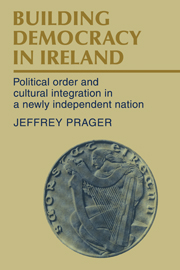 Building Democracy in Ireland
Building Democracy in Ireland Book contents
- Frontmatter
- Contents
- Preface
- Part 1 Democracy in Ireland: Theoretical and Empirical Problems
- 1 Introduction: Theoretical Considerations in the Study of Political Stability in New Nations
- 2 Irish Cultural Schisms and the Meaning of Political Disorder
- 3 The Free State Constitution and the Institutionalization of Value Strains
- Part 2 Patterns of Crisis Resolution in the Irish Free State, 1922–1932
- Part 3 The Character of Irish Democracy
- Notes
- References
- Index
2 - Irish Cultural Schisms and the Meaning of Political Disorder
Published online by Cambridge University Press: 25 October 2011
- Frontmatter
- Contents
- Preface
- Part 1 Democracy in Ireland: Theoretical and Empirical Problems
- 1 Introduction: Theoretical Considerations in the Study of Political Stability in New Nations
- 2 Irish Cultural Schisms and the Meaning of Political Disorder
- 3 The Free State Constitution and the Institutionalization of Value Strains
- Part 2 Patterns of Crisis Resolution in the Irish Free State, 1922–1932
- Part 3 The Character of Irish Democracy
- Notes
- References
- Index
Summary
Civil war, in any nation and at any time, represents the breakdown of fundamental common agreements universally shared by members of the society. It is the undoing of civility. The process may occur slowly or with alarming rapidity, but civil war is the culmination of a process whereby traditional mechanisms employed to forge agreement among diverse and, perhaps, competing sectors of the community are no longer available or viable. Differences become so hardened that neither power nor political authority can achieve agreement. In their place polarized ideologies emerge and crystallize, contesting the given arrangements of the society. A public order in which members “agree to disagree” does not exist. Civil war, in short, reveals, by their very absence, those conditions necessary for political and social order to prevail.
Because of the centrality of the Civil War to modern Irish politics and its obstruction to the initial establishment of a modern democratic order, it is important to understand the causes and character of the war. In this chapter, the question to be addressed is, why, despite the substantial consensus that characterized the nationalist struggle for political independence, did the factors surrounding the Civil War so rapidly and decisively produce major political schisms? The objective is to understand why the Irish public was incapable of resisting the dissolution of political order.
Most immediately, the Civil War was a dispute over the Articles of Agreement for a Treaty between Great Britain and Ireland, that is, the Anglo-Irish Treaty of 1921.
- Type
- Chapter
- Information
- Building Democracy in IrelandPolitical Order and Cultural Integration in a Newly Independent Nation, pp. 27 - 66Publisher: Cambridge University PressPrint publication year: 1986


